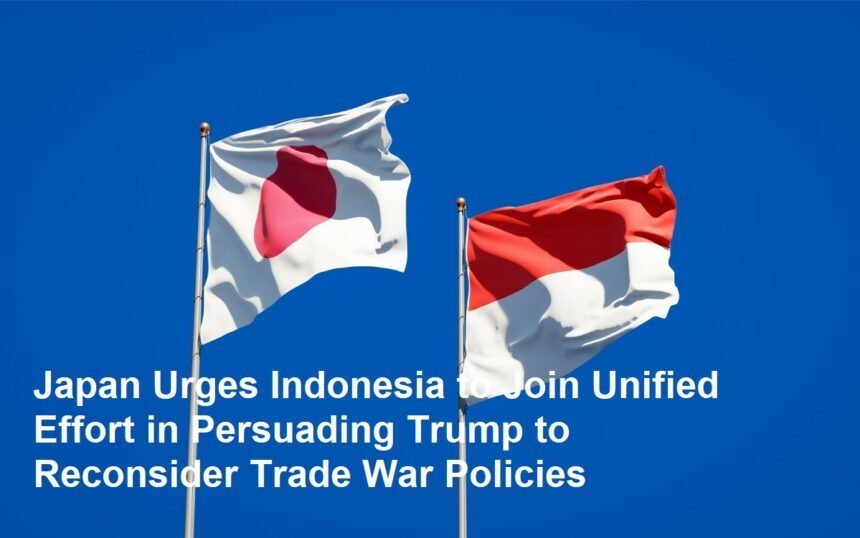In a bold diplomatic move, Japanese officials have called on Indonesia to join forces in persuading President Donald Trump to reconsider his nation’s aggressive trade war stance. Amid growing global economic uncertainty, Japan’s Ministry of Foreign Affairs has emphasized that regional unity is essential for mitigating the adverse effects of the ongoing trade conflict initiated by the United States.
The U.S. trade war, marked by steep tariffs and retaliatory measures, has sent shockwaves across international markets. Japan, one of the world’s largest economies, has experienced significant disruptions in its export-oriented sectors, while many Southeast Asian nations, including Indonesia, have felt the ripple effects. Recognizing the shared economic challenges, Japan is advocating for a consolidated approach where regional players collectively engage with Washington to foster more balanced trade relations.
A senior official from Japan’s Ministry of Foreign Affairs stated, “Our economic well-being is interconnected. By uniting our voices, we can present a compelling case to President Trump that addresses not only our regional concerns but also contributes to global economic stability.” This statement underlines Japan’s commitment to pursuing multilateral strategies over unilateral measures, highlighting the potential benefits of a united front in global trade negotiations.
Indonesia, with its robust economy and strategic position in Southeast Asia, is viewed as a pivotal partner in this initiative. Japanese diplomats believe that Indonesia’s active participation could lend additional weight to the regional call for a reassessment of U.S. trade policies. “Indonesia’s influence in the ASEAN community is immense, and its cooperation could be instrumental in bridging divergent interests,” the official added. This appeal is part of a broader effort to harness regional solidarity as a counterbalance to the unilateral economic policies that have defined recent U.S. trade actions.
The trade war has not only disrupted supply chains but has also fostered an atmosphere of uncertainty among global investors. Analysts warn that prolonged trade tensions could lead to long-term economic stagnation, undermining growth prospects in Asia and beyond. For Japan and Indonesia, two economies heavily reliant on international trade, the current environment poses a serious threat. The Japanese government is, therefore, urging Indonesia to coordinate its diplomatic channels and economic strategies with its regional allies to engage constructively with the U.S. administration.
Economic experts point out that while the U.S. trade war is intended to protect domestic industries, its broader impact has been largely detrimental to global trade dynamics. “The aggressive tariff policies have backfired in many respects, causing a decline in export performance and creating uncertainty in investment climates,” noted a trade analyst based in Tokyo. Both Japan and Indonesia stand to benefit from a recalibration of these policies, which could pave the way for more predictable and equitable trade frameworks.
In response to the Japanese call, Indonesian officials have signaled cautious optimism. A spokesperson for Indonesia’s Ministry of Trade remarked, “We acknowledge the challenges posed by the current trade environment. While any decision must prioritize Indonesia’s national interests, we are open to constructive dialogue that could lead to more stable trade relations.” This balanced stance reflects Indonesia’s pragmatic approach to international diplomacy, one that seeks to safeguard economic interests without compromising sovereignty.
The proposed strategy involves a series of high-level meetings between Japanese and Indonesian officials, with plans to extend invitations to other ASEAN nations. The goal is to formulate a unified proposal that outlines specific economic reforms and mutual concessions that could be presented to President Trump. Diplomatic sources indicate that this initiative may serve as a precursor to a broader multilateral dialogue aimed at reducing trade barriers and enhancing economic cooperation across the Pacific.
As the global community watches these developments closely, the success of this initiative could mark a significant turning point in international trade relations. Japan’s proactive outreach to Indonesia is a testament to the evolving nature of global diplomacy, where collaboration and unity are increasingly seen as the antidote to unilateral economic policies. With economies around the world striving for stability, the hope remains that a collective diplomatic effort will eventually prevail, setting the stage for a more balanced and sustainable global trade system.













